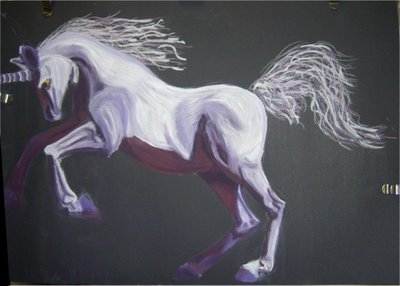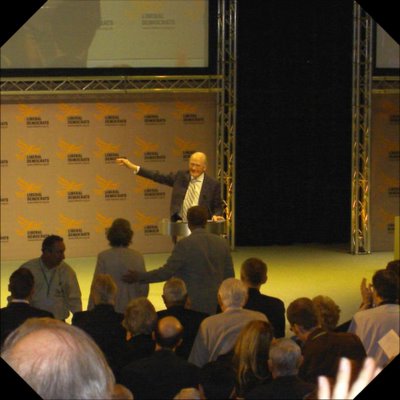For politics nargs, the big story of the week is the publication of the
POWER inquiry report - of which the executive summary at least is well worth reading. In the same week, no doubt inspired by this, I also came across this
Grauniad column by Campbell Robb of the National Council for Voluntary Organisations, and went to a discussion with Steve Webb MP about some of the innovative ways he is engaging individual voters in his Northavon constituency.
My gut reaction is to make fun of the POWER inquiry. It is the kind of committee of the great and the good that the
Liberator songbook dismissed as "A judge, an MP, Richard Holme, and a don, and a peer who is rapidly aging." Because this is the 21st century, they threw in representatives of (both black and white)
pop culture, and left out the MP. In fact, the inquiry produced a very detailed and well argued report.
The most surprising thing about the report is how unradical its big ideas are. The inquiry's reccomendations fall under three main headings:
1) Reforming government so elected people (MP's and councillors) actually exercise power.
2) Reforming the electoral system so the electorate actually choose elected people.
3) Encouraging (forcing?) elected people to engage their electors in new and innovative ways.
The first two of these are the sort of things Liberals and Liberal Democrats have been banging on about since time immemorial. While it is nice to see yet another blue ribbon commission endorse the Single Transferable Vote as the best electoral system there is, this doesn't tell us anything we don't already know. And nor is this an exclusively Lib Dem thing. The faction of the Labour party which is serious about democracy has also known all these things since the early years of the Thatcher government, if not before.
Although some of the specific suggestions on point (3) are new and interesting, the basic theme of voter engagement is something that was part and parcel of community politics as the Liverpool liberals imagined it when they were putting the idea together. The extent to which community politics (a radical reinvigoration of local democracy based on engaging with the electorate in new and innovative ways) became
FOCUS-style campaigning (a cynical attempt to garner votes by pretending to engage the local electorate) is unfortunate to say the least. The POWER report examines the differences between real and fake voter involvement, and if we want to play our part if reinvigorating democracy, we should pay attention.
To be fair to Liberal Democrat campaigners, one of the reasons why we rarely engage in real consultation with voters is that our elected officials do not generally exercise power. If Council tenants do not want their houses sold off, then any consultation on the issue will necessarily be fake because central government effectively forces Councils to sell off social housing. This goes back to the inquiry's point that all three reforms are mutually reinforcing.
By and large, the POWER report avoids the sort of politician-bashing that often accompanies discussions of political apathy. The report explicitly dismisses "the declining calibre of politicians" as a red herring. Nevertheless, some of the recommendations on public involvement suggest that the POWER commissioners don't trust elected representatives. There is a proposal that MP's should be required to hold AGM's and publish annual reports. This is exactly the kind of useless proposal that mistrust generates. The vast majority of MP's want to engage with their constituents, making the requirement unnecessary. For the minority that do not, a box-ticking process of fake engagement will not improve things. Ultimately, the if politicians do not seek new and innovative ways of engaging voters, the voters will seek new and innovative politicians (typically Liberal Democrats). Adopting STV makes it even easier for voters to enforce this kind of requirement without the need for rules.
Campbell Robb is even more willing to damn politicians with faint praise. Although he avoids saying that we are all scum, he suggests that "community groups" provide a better form of democratic involvement, and suggests that politicians need to adopt ways of working from the voluntary sector. Sorry, Mr Robb, but I'm involved with several voluntary organisations, and the way they conduct their internal affairs would be totally unacceptable if these organisations had the power to tax non-members and throw them in jail if they didn't pay. The formal processes of democracy exist for a reason.
My experience as a politician is that the main role of voluntary and community organisations in the formal political process is to ask for money. Robb's article is no exception - he argues that the government should give the organisations he represents grants so that they can create demand for democracy among the people. He looks forward to an era in which citizens empowered by an active (and rich) voluntary sector jump at the chance to be consulted by "a foundation hospital board or a school governing board". His distaste for politics blinds him to the fact that citizens can't be empowered when dealing with an unelected body. Empowerment requires you to have actual power. Both the POWER report and the experience of Liberal Democrat activists is that the voters already know what they want, and are already keen to be engaged with if politicians who can actually change things are prepared to engage with them - "community groups and volunary organisations" just get in the way.
Steve Webb agrees. We spent most of the meeting discussing the way he has used e-mail to consult his constituents about a range of local issues. He has over 10% of the electorate on a permission-based e-mail list, which he regularly "polls" on controversial issues. People (even busy people) are happy to read and think about the detailed arguments he presents on each side before replying with their view. In return, he lets them know how their views inform his Parliamentary work. There are a few obvious pitfalls - a poll on ID cards was an embarassment because Webb, as a Liberal Democrat, was not willing to accept the popular verdict in favour and instead asked the question again until he got the correct answer. But most of the questions MP's must deal with do not implicate basic values (the example he gave is whether wind turbines should be built in an area of outstanding natural beauty in his constituency), and engaging citizens directly pays dividends.
Unfortunately, too many politicians think like Robb and not Webb. Steve Webb does what he does because he thinks voters care about what he is doing, and want to take the time to read long serious e-mails and send considered replies. To say, "I'm a politician, it's my job to listen to you, can we talk about wind farms." requires politicians to admit that they are politicians, that it is politicians' job to listen to voters, and that politicians can legitimately exercise power on that basis. The third of these is the vital one.
A politician who cringingly accepts Campbell Robb's criticism of politicians allows power to be exercised by "non-political" quangoes and civil servants. Once politics leaves the equation, the views of voters are marginalised and the views of "stakeholders" and "community leaders" become paramount. Ordinary people who want to have their end up arguing with experts, in front of a decision-maker who shares the experts' worldview, and are therefore at a massive disadvantage. We are back to the fake consultation that the POWER inquiry dismisses.
Even deeper than the cringe about being a politician is the cringe about having an ideology. POWER identify "The main parties are too similar and lack principle" as one of the main reasons for political disengagement. An ideology is nothing more or less than an intellectually coherent set of political principles. And yet far too many politicians wallow in their lack of principles. "What counts is what works" says the Prime Minister, a man who also said, "We will not introduce top-up fees." Without an ideology, a political programme is just a laundary list of policies, with no reason to believe that they will be kept in office. No wonder that POWER finds that "Parties and elections require voters to commit to too wide a range of policies." Knowing that Menzies Campbell is a committed liberal tells me far more about how he will govern than reading a manifesto could. It also lets me know that those policy specifics we do agree on are unimportant.
Perhaps the most embarrasing sign of the politician's cringe is the need for the POWER inquiry at all. We should all know that democracy is good, and that politics is a necessary part of democracy. But somehow we need a QC and a DJ to tell us this. A major political tradition, operating through a political party with 63 MP's, has identified the problems with our democracy, proposed solutions, and is fighting elections on the basis of implementing those solutions. And yet it is still possible for a comission of the great and the good to make a splash by saying things we have been saying for twenty years.
Labels: Constitutional wonkery, pointy-headed wowzers








 Olly Kendall in the Grauniad
Olly Kendall in the Grauniad






 Development as Freedom
Development as Freedom Britons: Forging the Nation
Britons: Forging the Nation Georgiana: Duchess of Devonshire
Georgiana: Duchess of Devonshire
